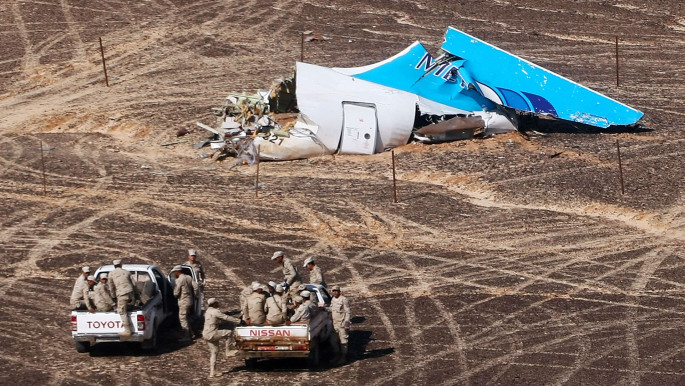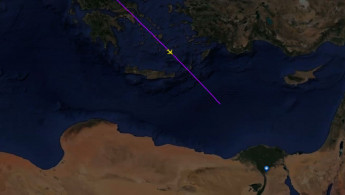EgyptAir flight from Paris crashes into Mediterranean, killing 66
An EgyptAir flight from Paris to Cairo crashed into the Mediterranean early on Thursday with 66 people on board, prompting an investigation into whether a mechanical failure or a bomb brought down the aircraft.
Search planes have reportedly located two orange items believed to be from the missing plane, 370 kilometres south-southeast of the island of Crete.
French President Francois Hollande confirmed that the plane had "crashed", and the Paris prosecutor's office said its accident department had opened an investigation.
Egypt's Aviation Minister Sherif Fathy said he could not rule out either terrorism or a technical problem but that the crash was "more likely" caused by an attack.
"I don't deny the hypothesis of a terrorist attack or something technical. It is too early," he told a news conference.
The Airbus A320 fell and swerved sharply twice in Egyptian airspace before it disappeared from radar screens, Greek Defence Minister Panos Kammenos said.
Egypt and Greece both said they had dispatched aircraft and naval vessels on a search mission and they were expected to be joined by French teams.
The aircraft was carrying 56 passengers, including one child and two infants, seven crew and three security officers. They included 30 Egyptian and 15 French nationals, along with nationals from 10 other countries, the EgyptAir has said.
Both France and Egypt have come under attack by the Islamic State group [IS] in the past year and Hollande promised a comprehensive investigation into the cause of the crash as suspicions swiftly focused on a bomb.
"We must ensure that we know everything on the causes of what happened. No hypothesis is ruled out or favoured," he said in a televised address.
Distress signals
The Greek civil aviation department has said the last communication with the pilot was three minutes before the plane disappeared, and that there had been no distress call.
Greek civil aviation chief Constantinos Litzerakos said the pilot had mentioned no problem in the last communication before the plane disappeared.
 |
|
| There are concerns the incident could be a terrorist attack [Getty] |
"The flight controllers contacted the pilot at a height of 37,000 feet... he did not mention a problem," Litzerakos told Greece's Antenna TV.
EgyptAir vice president Ahmad Adel also said there had been "no distress call" before it vanished.
EgyptAir had said military search and rescue had detected a "distress message", but the army denied detecting any such message.
"This is an aircraft that has a very good safety record," Dr Anil Padhra, senior lecturer in aviation at London's Kingston University, told The New Arab.
"It is possible that the pilot lost control, but due to the altitude that he was flying at, its very unlikely, because with the flight in autopilot he has very little to do. Even when the pilot wants to change the flight altitude, this is done by dialing in the number into a computer. For this reason, it is strange for a plane to go off the radar without first sending a warning."
Terror attack?
The President of the Russian Federal Security Service, Alexander Bortnikov, has claimed that the crash was due to a "terrorist attack".
"Unfortunately has been another incident today concerning an Egyptian Airlines Plane. It appears this is a terrorist action that has killed 66 citizens of about 12 countries," Bortnikov told Russian media outlets.
Egypt's prosecutor general has ordered a state security investigation into the missing plane.
Hollande's office said the French leader had spoken to Sisi and that both sides would cooperate closely in the investigation.
IS has been waging a deadly insurgency against Egyptian security forces, and last October claimed the bombing of a Russian airliner flying holidaymakers home from the Egyptian resort of Sharm al-Sheikh. All 224 people on board were killed.
Foreign governments issued travel warnings for Egypt and demanded a review of security at its airports after IS said it downed the plane with a bomb concealed in a soft drink can that had been smuggled into the hold.
"If there is evidence to suggest a mechanical failure, then we can suspect terrorism," said Dr. Padhra.
"At this stage however, it could be anything, even things you dont even think about like a deliberate sabotage."
In a separate incident, an EgyptAir plane was hijacked and diverted to Cyprus in March. The man who admitted to the hijacking was described by Cypriot authorities as "psychologically unstable" and remains in custody in Cyprus.
EgyptAir has set up a toll-free number for passengers' relatives: 080077770000





 Follow the Middle East's top stories in English at The New Arab on Google News
Follow the Middle East's top stories in English at The New Arab on Google News
![Israeli forces ordered bombed Gaza's Jabalia, ordering residents to leave [Getty]](/sites/default/files/styles/image_330x185/public/2176418030.jpeg?h=a5f2f23a&itok=_YGZaP1z)

